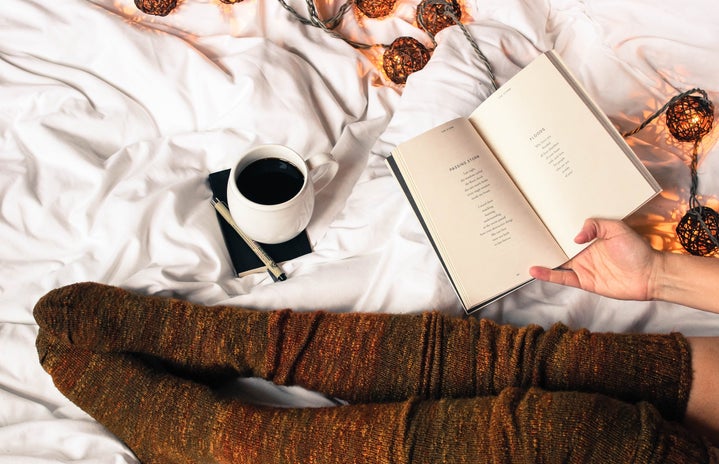Sure, we all know the names William Shakespeare, Emily Dickinson, and Edgar Allen Poe. But have you actually read some of their poems? Well now’s the time!
World Poetry Day is March 21st and it is your chance to immerse yourself in any kind of poetry—American, British, classic or modern. This day was created in the hopes of “supporting linguistic diversity through poetic expression and increasing the opportunity for endangered languages to be heard.” I think this day is incredibly important because it can shed light on such a valuable art form.
In high school, certain poets are forced into the curriculum, but the environment makes it hard to fully value the piece. Today, I challenge you to search the web, dust off that old ENG 111 textbook and flip through some poems or you can also view some of my favorites down below. In no way do you have to scan the poem’s meter and determine if it is a dactylic hexameter or whether the tone shifts in line 12 or 13. Just simply read it and see what happens, absorb the words and their meaning in whatever way seems right for you.
Below are some ways to participate in World Poetry Day:
1. Read the classics
I’ll admit, studying the classics in a school setting can be overwhelming and daunting. But, on your own time none of those pressures exist, making reading them much easier. I personally love the classics because even today traces of their influence can be found pieced together in modern poetry and prose. Some of my favorite classic poets include: Emily Dickinson (duh, we have the same first name), William Wordsworth, Samuel Coleridge, and John Keats. Below, I will list some of my favorite poems and lines by each of them.
Emily Dickinson
“Tell all the truth but tell it slant”
“The Truth must dazzle gradually or every man be blind.”
William Wordsworth
This one is a longer poem, but it reads almost like a short story.
Samuel Coleridge
“The Rime of the Ancient Mariner”
This is one of my favorite poems of all time. It is another long one that reads like a short story, but the images and themes are totally worth it. It also leans towards dark gothic tones but it is still considered a romantic piece.
John Keats
“When I have Fears That I May Cease to Be”
This isn’t exactly poetry, but his letters are also incredibly beautiful. I’m convinced that if you try hard enough, you can pretend they are poetry. It is also incredibly interesting to see how a poet is able to incorporate the same style and rhythmic tone even in letters which greatly differ from the standards in poetry.
Like I said before, there is no need to analyze each line and try to determine the author’s purpose—although I tend to enjoy those pieces. Simply reading the words and digesting their meaning is enough. If you find one or two lines that resonate and speak to your heart, then the poem has done its job. The purpose of poetry is to allow the reader to feel something—even if those things are love, hate, disgust, nostalgia, or sadness.
2. Dig into modern poetry
If you google, “modern poetry,” it lists the era as being 1890-1950, and those are the dates I went off of. In most cases, the pieces that make up this era are much easier to read in terms of language and form. My all-time favorite poets are Mary Oliver, Sylvia Plath and Wendy Cope—we love female poets. Some other favorites of mine are E. E. Cummings, Edna St. Vincent Millay and Dylan Thomas. I also included Margaret Atwood and Richard Siken, although they do not fit into the time period above. Below, I will list some of my favorite poems and lines by each poet.
E.E Cummings
“l(a” (a leaf falls on loneliness)
This poem is unique in its form, and the structure is what gives the poem most of its meaning. This is the shortest poem on my list, but I think it is also one of the most beautiful and creative ones.
Mary Oliver
“The Poet with His Face in His Hands”
“You want to cry aloud for your mistakes. But to tell the truth the world doesn’t need anymore of that sound”
This might be my favorite poem ever. The language is beautiful, and the heart wrenching story paired with her poetic style creates an incredible piece.
“It is your life, which is so close to my own that I would not know where to drop the knife of separation. And what does this have to do with love, except everything?”
Edna St. Vincent Millay
“I will put Chaos into fourteen lines”
“I will put Chaos into fourteen lines and keep him there; and let him thence escape if he be lucky”
Dylan Thomas
“Do not go gentle into that good night”
This poem was included in one of my favorite books, so when I had to analyze it for a class, I was ecstatic. The rhythm and flow of it are incredibly beautiful.
Sylvia Plath
My favorite stanza would have to be, “I dreamed that you bewitched me into bed and sung me moon-struck, kissed me quite insane. (I think I made you up inside my head.)”
I just love Sylvia Plath. Give me any of her poems and chances are, I will swoon.
Wendy Cope
“You fire off something fierce. You’re sunk.”
Margaret Atwood
“I would like to be the air that inhabits you for a moment only. I would like to be that unnoticed and that necessary.”
“You are not my cure, nobody has that power, you are merely a fellow/traveller”
Richard Siken
“I have a megaphone and you play along, because you want to die for love, you always have.”
This is one of my favorite poems. I love the line, “Tell me how all this, and love too, will ruin us”.
3. Write some of your own!
Writing poetry is much different than reading it, and it’s a lot harder than it looks. But, you don’t need to create iambic pentameter or perfect the abab rhyme scheme. None of these things are necessary if you just want to have fun. As long as you are able to extract something out of your mind and put it onto paper, you have succeeded. If you are doing it for yourself, then really the only purpose is to get thoughts onto paper. If you haven’t tried before then you might as well try on World Poetry Day!
Reading poetry gives me a sense of relief because I see that others feel the same way as me.
Anyone that reads poetry quickly finds that they are not alone.
Poetry offers a sense of intimacy and belonging that isn’t as present in other art forms. On the other hand, writing poetry offers an almost therapeutic environment; once I get the words out, they are no longer in my head. I also find that I normally don’t even know what I’m feeling until I get it on the page. I hope that if you participate in World Poetry Day, you find a sense of peace in doing so.
Who knows, maybe you’ll even find yourself enjoying it! But don’t worry, I won’t tell.



